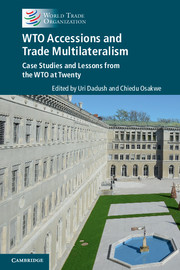Book contents
- Frontmatter
- Dedication
- Contents
- List of contributors
- Foreword
- Acknowledgements
- List of abbreviations
- Editors' note
- PART I WTO accessions, the trading system and the global economy
- PART II Overview: systemic outcomes from accessions
- PART III Members’ perspectives on accession negotiations
- PART IV Working party chairpersons’ perspectives on accession negotiations
- PART V Salient features inWTOAccession Protocols
- 29 Market access goods negotiations: salience, results and meaning
- 30 Services market opening: salience, results and meaning
- 31 WTO accession and the private sector: the nexus of rules and market opportunities
- 32 WTO accession and accession to the Agreement on Government Procurement: what is the relationship? Why should WTO acceding governments also consider GPA accession?
- 33 Energy-related rules in Accession Protocols: where are they?
- 34 Domestic framework for making and enforcing policies
- 35 Export duty commitments: the treaty dialogue and the pattern of commitments
- 36 Disciplining state trading practices: lessons from WTO accession negotiations
- 37 Intellectual property rights protection: the plus/minus debate from a least-developed country perspective – sense and nonsense
- 38 The future of multilateral investment rules in the WTO: contributions from WTO accession outcomes
- 39 Sanitary and phytosanitary measures: trends in accession plurilateral negotiations
- 40 Strengthening transparency in the multilateral trading system: the contribution of the WTO accession process
- PART VI Conclusion
- Annex: Contributor biographies
- Index
- Plate section
- References
36 - Disciplining state trading practices: lessons from WTO accession negotiations
from PART V - Salient features inWTOAccession Protocols
Published online by Cambridge University Press: 05 November 2015
- Frontmatter
- Dedication
- Contents
- List of contributors
- Foreword
- Acknowledgements
- List of abbreviations
- Editors' note
- PART I WTO accessions, the trading system and the global economy
- PART II Overview: systemic outcomes from accessions
- PART III Members’ perspectives on accession negotiations
- PART IV Working party chairpersons’ perspectives on accession negotiations
- PART V Salient features inWTOAccession Protocols
- 29 Market access goods negotiations: salience, results and meaning
- 30 Services market opening: salience, results and meaning
- 31 WTO accession and the private sector: the nexus of rules and market opportunities
- 32 WTO accession and accession to the Agreement on Government Procurement: what is the relationship? Why should WTO acceding governments also consider GPA accession?
- 33 Energy-related rules in Accession Protocols: where are they?
- 34 Domestic framework for making and enforcing policies
- 35 Export duty commitments: the treaty dialogue and the pattern of commitments
- 36 Disciplining state trading practices: lessons from WTO accession negotiations
- 37 Intellectual property rights protection: the plus/minus debate from a least-developed country perspective – sense and nonsense
- 38 The future of multilateral investment rules in the WTO: contributions from WTO accession outcomes
- 39 Sanitary and phytosanitary measures: trends in accession plurilateral negotiations
- 40 Strengthening transparency in the multilateral trading system: the contribution of the WTO accession process
- PART VI Conclusion
- Annex: Contributor biographies
- Index
- Plate section
- References
Summary
ABSTRACT
This chapter addresses a number of concerns associated with state trading. What are the applicable WTO rules in this area and have they kept up with the evolving nature of production methods and the changing landscape of state trading enterprises (STEs)? How have state trading practices been approached in WTO accession negotiations? How many WTO members acceding under the provisions of Article XII of the Marrakesh Agreement Establishing the World Trade Organization (WTO Agreement) have accepted specific obligations aimed at disciplining the operations of STEs? What specific patterns have emerged across these commitments and how have they evolved over time? Have the commitments resulting from WTO accession negotiations offered a more effective and forward-looking approach to disciplining STE activities? What is the systemic relevance of STE-related accession commitments and what lessons can be drawn about possible future multilateral disciplines in this area? What has been the contribution of accession commitments relating to transparency in privatisation programmes? STE disciplines have been in the rulebook of the multilateral trading system since 1947, but have not kept track with the evolving nature of state trading operations. State trading plays a significant role in the economies of the majority of Article XII members. The applicability of existing WTO rules in this area has therefore been put to practice in their accession negotiations. The commitments resulting from accession negotiations have produced more comprehensive and forward-looking disciplines, which arguably capture modern-day state trading operations more adequately. Specifically, STE-related accession commitments have evolved over time to extend the scope of obligations to the purchases and sales of both goods and services, contribute further definitional clarity to the term ‘state trading enterprise’ and address the transparency deficit in this area. In addition to steering the operations of acceding governments' STEs towards conformity with WTO principles, the evolution of these commitments is of systemic relevance to the multilateral trading system, as it points to the possible direction of future disciplines in this area. While not pre-judging the future development of multilateral provisions on state trading, it is argued that Article XII members, which today account for one-fifth of the WTO membership, are well placed to influence the direction of future discussions in the area of STEs.
- Type
- Chapter
- Information
- WTO Accessions and Trade MultilateralismCase Studies and Lessons from the WTO at Twenty, pp. 764 - 794Publisher: Cambridge University PressPrint publication year: 2015



